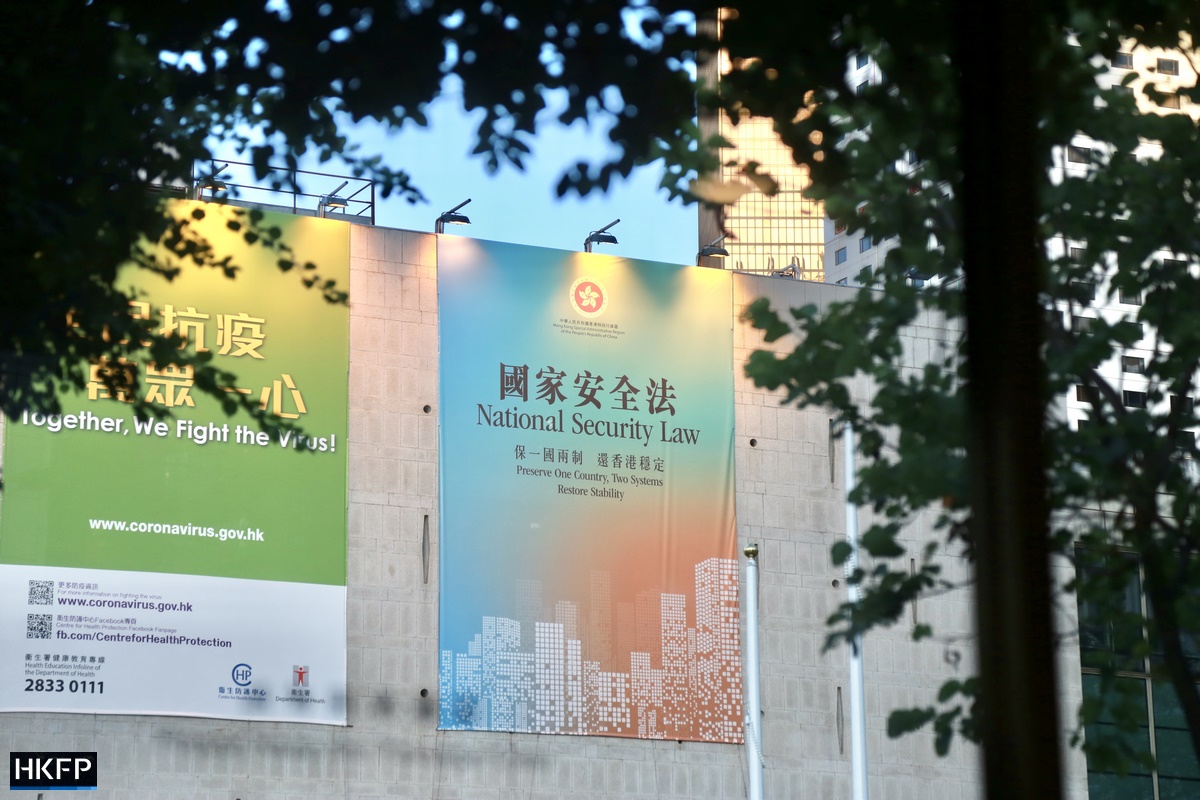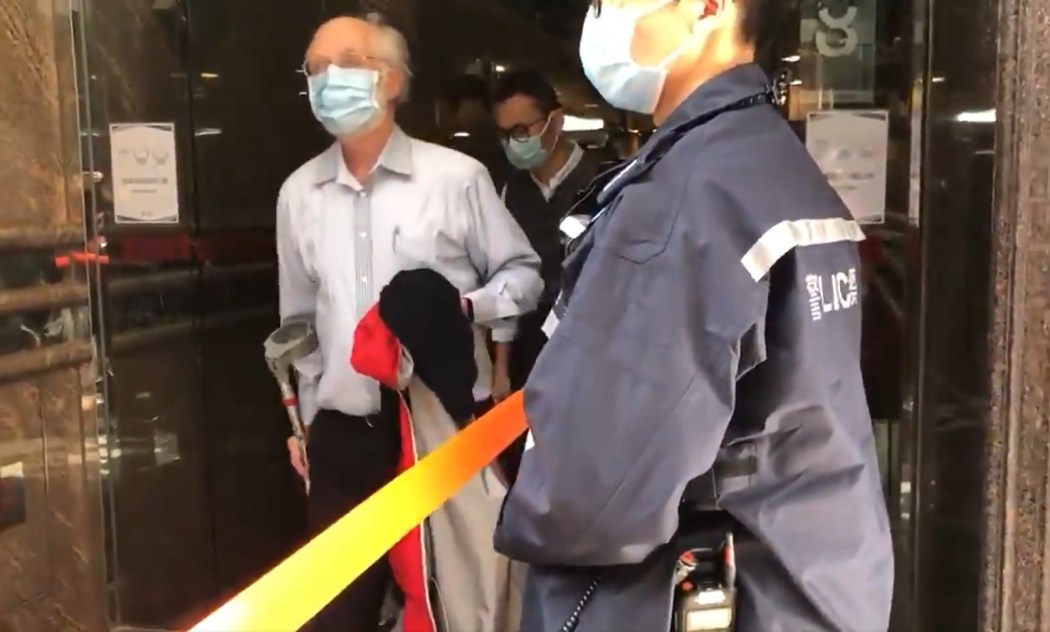The new year began with a city-wide police operation which saw more democrats rounded up under the security law than in the whole of the preceding six months.
Also in January, internet service providers blocked access to an anti-government website and authorities extended oaths of allegiance to district councillors and government contractors, as China’s leader Xi Jinping said the city must be “ruled by patriots.” The month ended with the start of a new visa scheme for British National (Overseas) passport holders as more Hongkongers look to leave the city.

HKFP continues its monthly roundup of how the security law is transforming Hong Kong.
More than 50 pro-democracy figures arrested over primary election
Most of Hong Kong’s most prominent pro-democracy figures were arrested in one fell swoop on the first Wednesday of the new year as police rounded up 53 democrats for alleged subversion under the security law.
The mass arrests, which saw around 1,000 officers deployed across the city, were made over participation in a city-wide unofficial primary election held by the democratic camp last July in advance of a now-postponed Legislative Council race.
Concurrently, officers raided a pro-democracy law firm and visited the newsrooms of Apple Daily, StandNews and InMedia with search warrants for documents relating to the arrested democrats.

The roundup marked the first time a person with foreign citizenship — US lawyer John Clancey — had been arrested under the security law. Two activists who were already detained on separate charges – Joshua Wong and Tam Tak-chi – were also arrested while in custody under the security law. All but three of the 55 arrested were later released on bail and none have so far been formally charged.
The operation, which officials called “necessary” to secure national security, drew strong criticism from foreign governments, with UK Foreign Secretary Dominic Raab decrying it a “grievous attack” on the city’s promised freedoms. Organiser of the primary election Benny Tai warned that the pro-democracy movement had entered a “bitter winter” as public broadcaster RTHK told reporters not to interview those arrested.
Anti-government website blocked
A pro-democracy website was blocked by at least one of the city’s major telecom providers following a police order, sparking fears of encroaching internet censorship in the name of national security. The site, HKChronicles, served as a doxxing platform against police officers and pro-Beijing figures and also collected information on the 2019 protests.

Telecoms provider HKBN later confirmed the site ban in compliance with an order under the national security law. The site was also inaccessible on services provided by PCCW, Smartone and China Mobile (Hong Kong). The site operator later acquired a new domain to bypass the ban.
It was the first time police had used their powers under the security law to censor online information.
Pro-independence activists released unconditionally
Three teenage pro-independence activists became the first to be released unconditionally after being arrested under the security law. Yanni Ho, Ho Nok-hang and Chan Wai-jin no longer need to report to the police and have had their passports returned. The former members of the activist group Studentlocalism were arrested twice last year for allegedly “inciting secession” through social media posts.

Tony Chung, who was arrested with the trio, remains in prison as he awaits trial on charges of “inciting secession” under the security law and money-laundering.
More activists flee abroad
Rights groups reported more activists fleeing the city to seek asylum in the West. A Canadian non-profit said 14 activists had been granted asylum by authorities there, while around 30 other applications are pending a decision.
Separately, at least five more activists arrived to claim asylum in the US after fleeing via Taiwan.
HSBC head defends closing democrat’s bank accounts
HSBC’s Chief Executive Noel Quinn defended the bank’s freezing and closing of accounts belonging to self-exiled democrat Ted Hui and his family, saying the bank must abide by the security law. Quinn and the bank were accused by UK parliamentarians of “hypocrisy” and “appeasement.”

Hui had accused the bank of trampling on his rights after it closed his bank accounts on police orders. The former opposition lawmaker fled to the UK in December with his family, citing the security law and the mass resignation of the political opposition in the city’s legislature.
Oaths of fealty to the government extended
All civil servants who had not yet pledged loyalty to the government were given four weeks to sign a declaration to that effect or face possible dismissal, prompting a union formed during the 2019 protests to disband.
Separately, the government announced plans to extend the mandatory oath to all district councillors and government contractors.

The move to extend the pledge of allegiance comes amid increasing pressure from mainland authorities to ensure Hong Kong is ruled by individuals who “love the motherland and the Chinese Community Party.” China’s leader Xi Jinping last week reiterated in comments to Chief Executive Carrie Lam the need for the city to be ruled by “patriots” in order to preserve One Country, Two Systems.
British National (Overseas) visa scheme begins
January ended with the opening of the extended British National (Overseas) (BNO) visa scheme, which allows BNO passport holders and dependants to work or study in the UK for up to five years, with a pathway to full citizenship after six years. The new scheme, announced in response to the security law, entitles up to around 70 per cent of HongKongers to relocate to the UK.
The UK estimates as many as 322,000 Hongkongers may move to its shores in the next five years. Beijing announced it would no longer recognise the BNO as valid documentation in retaliation.
Gov’t announces ID registration for SIM cards
Authorities announced plans to make ID registration mandatory for SIM card purchases in the city in a bid to curb crime. The proposal would allow telecommunications companies to store personal data for 12 month while law enforcement agencies would have access to the data without court approval under “emergency circumstances.” A public consultation of one month for the proposal began on Saturday.
Experts have criticised the proposal, saying criminals could find workarounds, whilst democrats have voiced fears of encroaching state surveillance.
Support HKFP | Policies & Ethics | Error/typo? | Contact Us | Newsletter | Transparency & Annual Report | Apps
Help safeguard press freedom & keep HKFP free for all readers by supporting our team
























